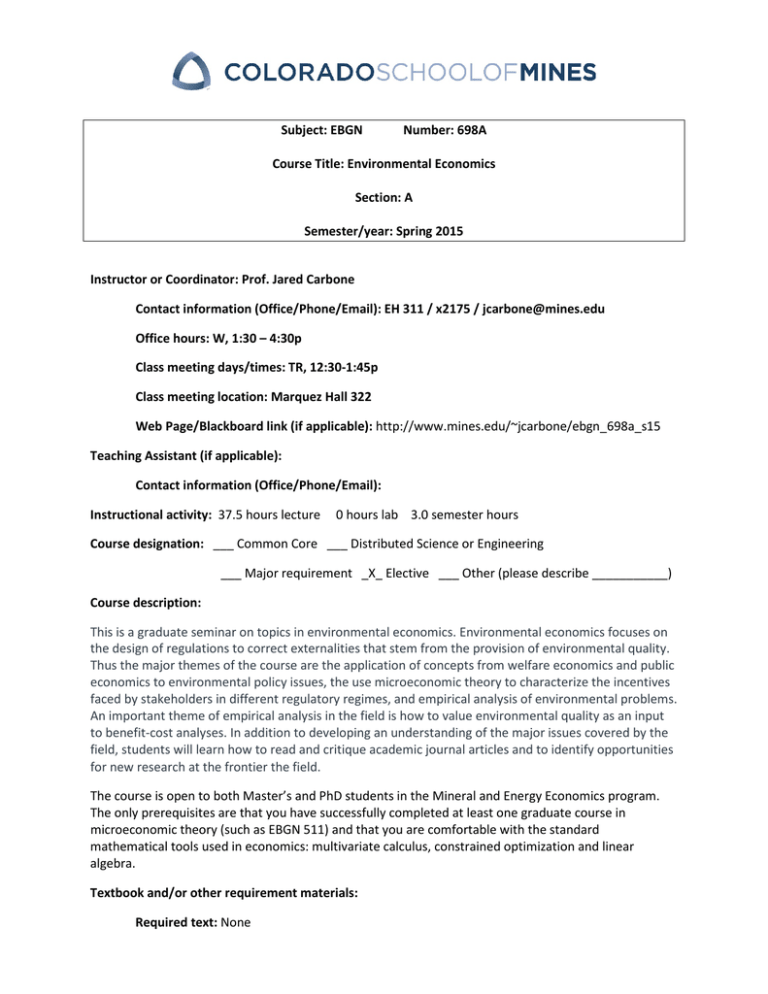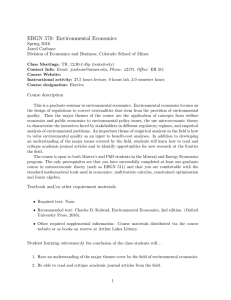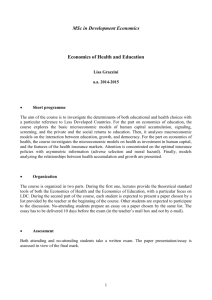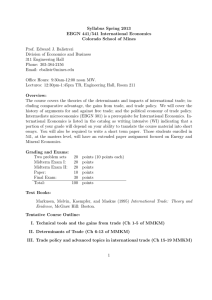Subject: EBGN ... Course Title: Environmental Economics Section: A
advertisement

Subject: EBGN Number: 698A Course Title: Environmental Economics Section: A Semester/year: Spring 2015 Instructor or Coordinator: Prof. Jared Carbone Contact information (Office/Phone/Email): EH 311 / x2175 / jcarbone@mines.edu Office hours: W, 1:30 – 4:30p Class meeting days/times: TR, 12:30-1:45p Class meeting location: Marquez Hall 322 Web Page/Blackboard link (if applicable): http://www.mines.edu/~jcarbone/ebgn_698a_s15 Teaching Assistant (if applicable): Contact information (Office/Phone/Email): Instructional activity: 37.5 hours lecture 0 hours lab 3.0 semester hours Course designation: ___ Common Core ___ Distributed Science or Engineering ___ Major requirement _X_ Elective ___ Other (please describe ___________) Course description: This is a graduate seminar on topics in environmental economics. Environmental economics focuses on the design of regulations to correct externalities that stem from the provision of environmental quality. Thus the major themes of the course are the application of concepts from welfare economics and public economics to environmental policy issues, the use microeconomic theory to characterize the incentives faced by stakeholders in different regulatory regimes, and empirical analysis of environmental problems. An important theme of empirical analysis in the field is how to value environmental quality as an input to benefit-cost analyses. In addition to developing an understanding of the major issues covered by the field, students will learn how to read and critique academic journal articles and to identify opportunities for new research at the frontier the field. The course is open to both Master’s and PhD students in the Mineral and Energy Economics program. The only prerequisites are that you have successfully completed at least one graduate course in microeconomic theory (such as EBGN 511) and that you are comfortable with the standard mathematical tools used in economics: multivariate calculus, constrained optimization and linear algebra. Textbook and/or other requirement materials: Required text: None Other required supplemental information: Course materials distributed via the course website or as books on reserve at Arthur Lakes Library. Student learning outcomes: At the conclusion of the class students will… 1. Have an understanding of the major themes cover by the field of environmental economics. 2. Be able to read and critique academic journal articles from the field. 3. Be able to identify research questions at the frontier of the field. Brief list of topics covered: 1. Principles of welfare economics, public economics and applied microeconomic theory 2. Theory and empirics of environmental regulation 3. Environmental valuation Policy on academic integrity/misconduct: The Colorado School of Mines affirms the principle that all individuals associated with the Mines academic community have a responsibility for establishing, maintaining and fostering an understanding and appreciation for academic integrity. In broad terms, this implies protecting the environment of mutual trust within which scholarly exchange occurs, supporting the ability of the faculty to fairly and effectively evaluate every student’s academic achievements, and giving credence to the university’s educational mission, its scholarly objectives and the substance of the degrees it awards. The protection of academic integrity requires there to be clear and consistent standards, as well as confrontation and sanctions when individuals violate those standards. The Colorado School of Mines desires an environment free of any and all forms of academic misconduct and expects students to act with integrity at all times. Academic misconduct is the intentional act of fraud, in which an individual seeks to claim credit for the work and efforts of another without authorization, or uses unauthorized materials or fabricated information in any academic exercise. Student Academic Misconduct arises when a student violates the principle of academic integrity. Such behavior erodes mutual trust, distorts the fair evaluation of academic achievements, violates the ethical code of behavior upon which education and scholarship rest, and undermines the credibility of the university. Because of the serious institutional and individual ramifications, student misconduct arising from violations of academic integrity is not tolerated at Mines. If a student is found to have engaged in such misconduct sanctions such as change of a grade, loss of institutional privileges, or academic suspension or dismissal may be imposed. The complete policy is online. Grading Procedures: Homework assignments and exams are marked on a numerical (percentage) basis, then converted to letter grades. The course grade is then calculated using the weights indicated above. As a guide to determining standing, the following letter grade equivalence will generally apply: A+ 97-100 B 83-86 C- 70-72 A 93-96 B- 80-82 D+ 67-69 A- 90-92 C+ 77-79 D 60-66 B+ 87-89 C 73-76 F <60 Students must successfully complete all components of the course to successfully complete the course. At the instructor’s prerogative, remedial assignments for partial credit may be requested of students who have attempted term work without achieving passing grades. Any work which is not attempted and submitted will be assigned a grade of zero. There is no final exam during the final exam period for this course. Students must complete a final project that is due during the exam period. Notes: • Students seeking reappraisal of a piece of graded term work (term paper, essay, etc.) should discuss their work with the Instructor within 15 days of the work being returned to the class. Readings and Homework Assignments The readings will be posted on the course website at least a week in advance of day they are due. I expect you to be an active participant in class discussions. There will typically be two to four assigned readings from the reading list that I expect you to have read before class. The discussion and lecture in our class meetings will build on the readings -- not replicate them. Over the course of the term, you will write two essays (3000-4000 words) and lead a class discussions on the ideas contained in your essays. Typically, I will spend Tuesdays lecturing on the topic du jour and Thursdays will be devoted (in whole or in part) to discussion based on the essay assignment written by someone in the class (at least until we get off schedule). At least one of your essays should cover an article from the section of the reading list covered by the course that week. The other essay may cover an article from the reading list or a paper from the program of the NBER Summer Institute EEE Group in the last five years (you can download the papers from here: http://www.nber.org/summer-institute). You must answer the following questions in your essay. • • • • • • What is the research question described in the article? Why is this an important question for scientists (and humanity) to try to answer? What is the main result? What is the basic strategy the authors use to address the question? Do you think this strategy is appropriate? Why or why not? In particular, are there aspects of the design that might invalidate the authors' interpretation of the results? How should this result guide future research in this area? The organization of your essay should reflect these priorities. I expect the essays to be written professionally (i.e. they should be written in clear, well-organized, grammatically correct English, properly referenced, and written in a style consistent with the production of a professional document like the journal articles you are reading for class.) The essay of the week should be distributed to me and the students at the class meeting immediately preceding the one in which you are scheduled to present. All students who are not presenting that week must have read the article that is the subject of class discussion ahead of time and be prepared to comment on it. I will randomly assign which weeks each student’s essays are due. If you have a preference to write in a week other than one of the ones I assign you, you are welcome to negotiate a trade with your fellow students. Please inform me of any such transactions well in advance of the due dates. Final Project In the final research paper, you will identify an original research question of your own from the topics covered in the course, explain why it is an important question to answer, place it in the context of the field by conducting a thorough review the existing literature on your topic, and propose a strategy for answering the question. As part of proposing a strategy, you need identify the specific techniques you would employ to answer the research question and demonstrate a clear path to execution. For example, if you are answering an empirical question you need to propose a research design - a credible way of identifying the effect of interest using available data. If you are answering a theoretical question, you need to identify and defend the key assumptions that would go into an analytical model. To help you get started with the final paper project, you are required to submit a short (2 page, singlespaced) proposal in which you explain what your research topic is and why you think it is suitable for the assignment (as judged by the criteria for the project outlined above.) The proposal is due by March 31st and you must subsequently arrange a time to discuss your proposal with me. I will give you feedback on your proposal and suggest changes if I do not feel the topic is suitable in its original form. Distinguished Lecture Series: Lawrence Goulder, Professor of Economics at Stanford University, will be coming February 6 to give a public lecture on the economics and policy of global warming. We will attend the lecture as a class. Part of your class participation grade will reflect your participation in this activity. Evaluation Final grades will be based on class participation (20%), two essay assignments and class presentations based on your essays (40% collectively) and a final research paper (40%). Coursework Return Policy: Graded coursework will be returned to students within two weeks of the date it is submitted for evaluation. Absence Policy (e.g., Sports/Activities Policy): You are required to attend lecture. Notification of planned absences must be given to the instructor in advance. Common Exam Policy (if applicable): N/A Preliminary Class Schedule: I. The Environment and Economics [Weeks 1-2: January 8-15] o Scope of the Problem o Positive vs. Normative Analysis o Social Choice II. Review of Empirical Methods [Weeks 3-4: January 20-29] o Reduced-Form Estimation o Structural Estimation and Calibration o Reduced-Form vs. Structural Approaches III. Public Goods and Externalities [Week 5: February 3–5] o Public Goods and Externalities o Voluntary Provision of Public Goods IV. Environmental Regulation [Weeks 6-8: February 10-26] o Political Economy of Environmental Regulation o Price vs. Quantity Instruments o Voluntary Measures o Risk, Insurance and Liability o Innovation o Uncertainty and Asymmetric Information V. Discounting, Uncertainty, Preservation, Irreversibilities and Option Value [Week 9: March 3–6] o Discounting o Option Value o Irreversibility, feedback effects and tipping points Spring Break: March 7-15 VI. Valuing the Environment [Weeks 11-14: March 17 – April 7] o Demand for Environmental Goods and Services o Hedonics o Equilibrium Sorting o Hedonics and Climate Change o Household Production: Travel Cost and Averting Expenditures o Constructed Markets o Voluntary Mechanisms Final Project Proposals Due: March 31 E-Days: April 2-4 VII. Trade and Transboundary Pollution [Weeks 14-16: April 9–23] o Interjurisdictional Competition o Trade and the Environment o Carbon Leakage and Unilateral Climate Policy o International Environmental Agreements Topics and Catch-Up: April 28–30



